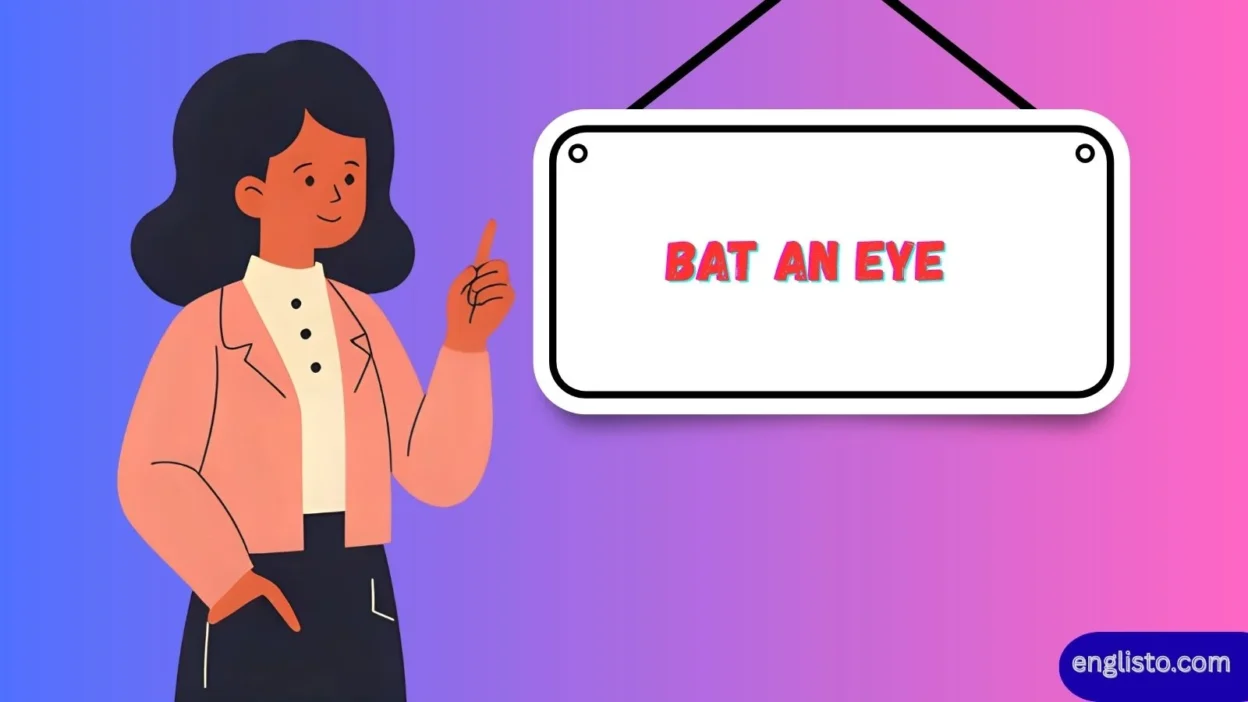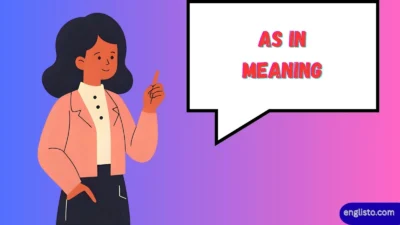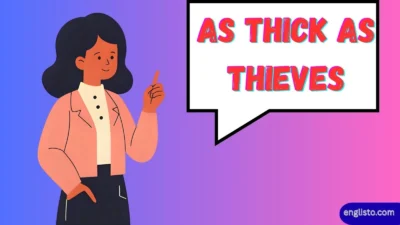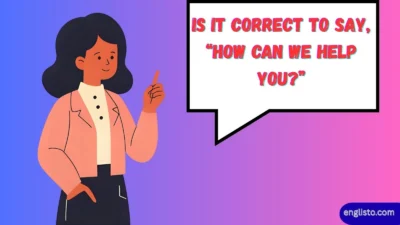Language is full of fascinating idioms that make conversations sound natural, expressive, and even witty. One of those is “bat an eye.” You’ve probably heard people say things like “She didn’t even bat an eye” or “He bat an eye when he saw the mess.” But what does this expression really mean? Where does it come from? And how should you use it correctly?
This in-depth guide unpacks everything about the phrase “bat an eye”—from its definition, origin, and grammar to its common usages, examples, and subtle variations. By the end, you’ll not only understand it but also know how to use it naturally in your own conversations or writing.
What Does “Bat an Eye” Mean?
At its core, “bat an eye” means to blink or react emotionally to something, especially to show surprise, shock, or concern.
However, it’s most often used in the negative form—for example:
“She didn’t even bat an eye when she heard the news.”
In this sense, it means someone showed no reaction at all, even when most people would.
In Simple Terms
| Phrase | Meaning | Example |
| Bat an eye | To blink or react | “He batted an eye when the light flashed.” |
| Not bat an eye | To not react or show emotion | “She didn’t bat an eye at the insult.” |
So, the idiom is often about the absence of reaction, not the action itself. When you say someone “didn’t bat an eye,” you’re emphasizing their calmness, indifference, or emotional control.
The Grammar Behind “Bat an Eye”
The idiom follows a simple grammatical pattern:
Subject + (did/didn’t) + bat + an eye
Examples:
- “He didn’t bat an eye when the price doubled.”
- “She bat an eye at the noise.” (Less common—usually used negatively)
- “He bats eyes.” (Incorrect—idiomatically awkward)
In American English, the expression is “bat an eye.”
In British English, the equivalent is often “bat an eyelid.”
| American English | British English | Meaning |
| Bat an eye | Bat an eyelid | Show or not show reaction |
| Not bat an eye | Not bat an eyelid | Stay calm, unaffected, or unmoved |
Origin and History of “Bat an Eye”
The idiom dates back to the early 19th century, rooted in the literal action of blinking—what happens naturally and almost imperceptibly fast. The verb “to bat” here means “to flutter or move quickly.”
The phrase evolved metaphorically to describe someone’s composure—as if they’re so unmoved that they don’t even blink. By the late 1800s, the phrase “not bat an eye” was commonly used in literature and conversation to mean “showing no surprise or reaction.”
Fun fact: The expression likely gained popularity because blinking is one of the most involuntary, subtle body reactions—so if someone doesn’t even blink, they must be completely unfazed.
Examples of “Bat an Eye” in Sentences
Let’s see how the phrase is used in real-world contexts:
| Context | Example Sentence |
| Surprise | “When the fireworks went off, she didn’t bat an eye.” |
| Disbelief | “He lied to everyone without batting an eye.” |
| Shock or Emotion | “She saw the accident but didn’t bat an eye.” |
| Calmness under pressure | “Even during the interview, he didn’t bat an eye.” |
| Sarcasm or criticism | “You broke the vase and didn’t even bat an eye?” |
Notice how it can express admirable calmness or cold indifference, depending on tone and context.
Synonyms and Similar Expressions
| Expression | Meaning | Tone |
| Keep a straight face | Show no emotion or amusement | Neutral |
| Stay cool | Remain calm under stress | Informal |
| Show no reaction | Display no emotional response | Formal |
| Be unfazed | Not disturbed or affected | Neutral |
| Maintain composure | Stay calm and collected | Formal |
| Brush it off | Dismiss without concern | Casual |
Tip: “Not bat an eye” is slightly more expressive and idiomatic than these synonyms, so it sounds more natural in storytelling and dialogue.
Idiomatic Variations
While “bat an eye” is the standard form, you’ll also find a few close variations:
- Not bat an eyelash – More common in the U.S.
- “She didn’t bat an eyelash at his rude comment.”
- “She didn’t bat an eyelash at his rude comment.”
- Not bat an eyelid – Common in the U.K.
- “He didn’t bat an eyelid when the storm hit.”
- “He didn’t bat an eyelid when the storm hit.”
All three—eye, eyelid, eyelash—convey the same meaning, so you can use them interchangeably depending on regional preference.
Emotional Nuance: Indifference vs. Strength
The beauty of idioms like “not bat an eye” lies in their dual meaning. It can describe:
- Indifference or lack of empathy
“He watched the chaos and didn’t bat an eye.” - Composure or courage
“She faced the critics without batting an eye.”
The interpretation depends on context and tone—whether the calmness is admirable or heartless.
| Emotion Type | Description | Example |
| Indifference | Cold or uncaring | “He didn’t bat an eye when his friend left.” |
| Courage/Calm | Brave or composed | “She didn’t bat an eye during the tense negotiation.” |
Real-Life Usage in Media and Literature
You’ll find this idiom in movies, novels, songs, and news reports. It’s a popular choice for describing emotional restraint or confidence.
- In films:
“Even as the villain threatened him, the hero didn’t bat an eye.” - In news headlines:
“Investors didn’t bat an eye at the new tax policy.” - In literature:
“He didn’t bat an eye when the truth finally surfaced.” — Modern English Novels
The phrase works beautifully in both formal and informal writing because it’s vivid yet simple.
How to Use “Bat an Eye” Naturally
Here’s how to make this idiom sound authentic in conversation or writing:
Use it to show calmness or indifference:
“When everyone panicked, she didn’t bat an eye.”
Use it to emphasize confidence:
“He didn’t bat an eye when asked the toughest question.”
Avoid overusing it in literal contexts:
“She bat an eye because of dust” → sounds awkward (use “blinked” instead).
Combine it with emotional verbs for impact:
“He smiled coldly, not batting an eye.”
Common Mistakes to Avoid
| Mistake | Why It’s Wrong | Correct Form |
| “He didn’t bat his eyes.” | Too literal, not idiomatic | “He didn’t bat an eye.” |
| “She bats her eyes” (meaning calm) | Refers to flirtation, not composure | “She didn’t bat an eye.” |
| “He didn’t blink an eye.” | Redundant | “He didn’t bat an eye.” |
“Bat your eyes” can also mean to flirt playfully by blinking quickly, especially when describing someone batting their eyelashes. Context makes all the difference.
“Bat an Eye” in Everyday Conversations
Let’s look at how you might hear or use it in natural dialogue:
A:
“Did you see how calm Maria was when the boss yelled?”
B:
“Yeah, she didn’t even bat an eye!”
A:
“The price doubled overnight.”
B:
“Investors didn’t bat an eye—they expected it.”
A:
“You crashed his car and he didn’t bat an eye?”
B:
“He’s impossible to read!”
Cultural and Emotional Layers
Different cultures may interpret the idiom slightly differently:
- In Western contexts, not batting an eye may reflect professionalism or strength.
- In Eastern cultures, it can also hint at emotional restraint or politeness.
- In everyday English, it’s mostly a colorful way to describe emotional steadiness—or lack thereof.
When to Use It in Writing
You can effectively use “not bat an eye” in:
- Narrative writing to describe calm reactions.
- Character descriptions to show composure or indifference.
- Dialogue for natural, expressive speech.
- Journalism or business writing to express stability or confidence.
Example (Creative Writing):
“The storm tore through the city, but the old man by the window didn’t bat an eye.”
Example (Business Context):
“The company didn’t bat an eye at the competition’s new product.”
Quick Recap Table
| Aspect | Details |
| Phrase | Bat an eye / Not bat an eye |
| Meaning | To react (or not react) to something |
| Tone | Usually calmness, indifference, or confidence |
| British Equivalent | Not bat an eyelid |
| American Variant | Not bat an eyelash |
| Common Contexts | Emotion, surprise, composure |
| Grammar Pattern | Subject + (did/didn’t) + bat + an eye |
FAQs about “Bat an Eye”
Q: Is “bat an eye” formal or informal?
A: It’s neutral—perfect for both speech and writing. You’ll find it in news, literature, and casual talk alike.
Q: Can I say “blink an eye” instead?
A: Grammatically yes, but idiomatically no. “Bat an eye” is the fixed phrase that carries the figurative meaning.
Q: What’s the opposite of “not bat an eye”?
A: Expressions like “be shocked,” “jump,” “flinch,” or “show alarm” express the opposite reaction.
Q: Does “bat your eyes” mean the same thing?
A: No. “Bat your eyes” usually refers to blinking flirtatiously, often to get attention.
Final Thoughts
“Bat an eye” is a compact yet powerful idiom that adds depth and color to English expression. It captures the art of emotional control—how someone can stay calm in chaos, brave under pressure, or simply indifferent to the world around them.
Next time you hear someone say, “She didn’t bat an eye,” you’ll know it’s not about blinking—it’s about being unshaken, unbothered, and completely composed.
In short:
To bat an eye is human.
To not bat an eye is confidence—or coldness—at its finest.



